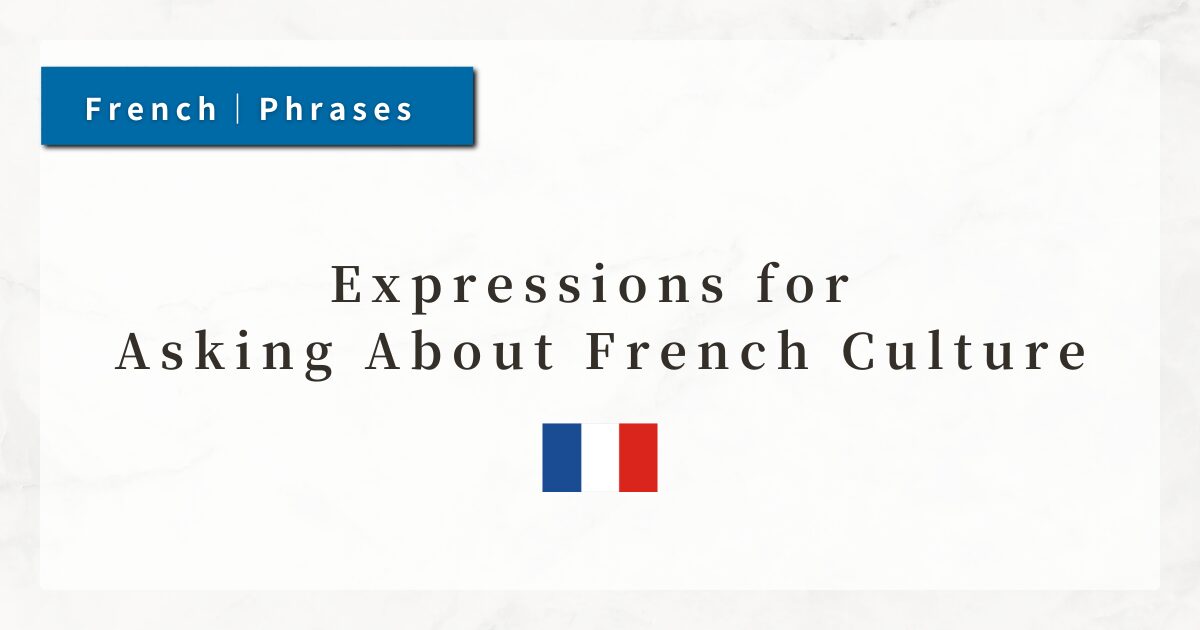#6 Expressions for Asking About French Culture|French Conversation Examples

One of the most common motivations for learning French is an interest in French culture.
French cinema, wine and cheese, fashion, philosophy, museums, and café culture—all of these diverse and rich aspects of French culture have long fascinated people around the world.
Because of this, conversations often include questions such as “What do you like?” or “Which is your favorite?” in relation to cultural topics.
In this lesson, I will introduce expressions that you can use in conversations about French culture, along with phrases well-suited for cultural discussions.
Dialogue

Tu t’intéresses à la culture française ?
(Do you have an interest in French culture?)

Oui, beaucoup ! J’aime bien le cinéma français et la gastronomie.
(Yes, very much! I quite like French cinema and gastronomy.)

Tu as un film français préféré ?
(Do you have a favorite French film?)

Oui, Intouchables. C’est un film très touchant.
(Yes, Intouchables. It’s a very moving film.)

Et la gastronomie, qu’est-ce que tu préfères ?
(And in gastronomy, what do you prefer?)

Le fromage ! Il y en a tellement en France.
(Cheese! There are so many varieties in France.)
1. The Reflexive Verb: s’intéresser à
The reflexive verb “s’intéresser à” (to be interested in) must agree with the subject and the reflexive pronoun.
- Je m’intéresse à la culture.
(I am interested in culture.) - Tu t’intéresses à l’art ?
(Are you interested in art?)
In conversation, raising the intonation at the end — “Tu t’intéresses à … ?” — is a soft, natural way to show interest in the other person.
2. Expressing Preferences: aimer bien / préféré
“aimer bien” conveys “to quite like” or “to have a liking for.” It is softer and more casual than aimer (to love).
- J’aime bien le vin rouge.
(I quite like red wine.)
préféré(e) means “favorite” and usually follows the noun.
- un film préféré
(a favorite film) - une chanson préférée
(a favorite song)
3. The Adjective touchant
The adjective touchant(e) means “moving” or “touching.”
- un film touchant
(a moving film) - une histoire touchante
(a moving story)
It derives from the verb toucher (to touch), carrying the nuance of “touching the heart” → “moving, emotionally affecting.”
4. The Structure: Il y en a tellement
The phrase “Il y a …” means “there is/are …”
- Le fromage ! Il y en a tellement en France.
(Cheese! There are so many varieties in France.)
en is a neutral pronoun that refers to a noun already mentioned (e.g., fromage). It often refers to a partitive or indefinite quantity.
tellement is an adverb meaning “so much,” “so many,” or “to such an extent,” emphasizing quantity or degree.
- Il y en a beaucoup.
(There are many.) - Il n’y en a pas.
(There are none.) - Il y en a quelques-uns.
(There are a few.)
The pronoun en always refers back to a noun mentioned earlier in the conversation.
Although it may feel challenging at first, it is very commonly used, so it is important to gradually become familiar with it.
Summary
- Tu t’intéresses à … ?
→ A reflexive expression to ask “Are you interested in …?” - aimer bien / préféré
→ Natural ways to express liking or preferences. - touchant
→ An adjective meaning “moving” or “touching.” - Il y en a tellement.
→ A phrase used to emphasize abundance or variety.




